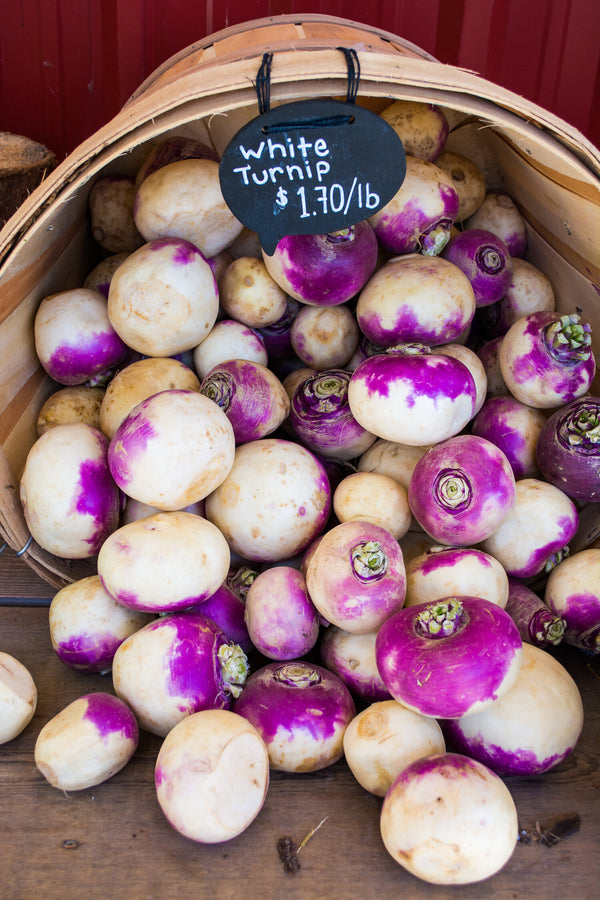eating in season: why it's good for you and for the earth
A few months ago, Jesse bought a beautiful cookbook where every recipe focuses on cooking and eating vegetables in season. After flipping through the book a few times, I started really thinking about what the term Eating In Season means. Can eating this way really benefit our overall health and the planet? I often wonder if this term is just another trendy, food-related fad that is thrown around with out having a true understanding of what it means. There is no doubt about it, we are part of a global food supply chain. It is possible to get just about ingredient we want, at any time of the year. This fact can either be viewed as a wonderful luxury or something we should be concerned about.
Simply put, Eating In Season means eating foods that are grown and/or harvested in the time of year (or season) that we are cooking and consuming them. For example, the best time to eat squash and apples is in the fall when they are highly available and easiest to get. Strawberries and peaches are in bountiful supply in the summer months, especially at local farms.
It should be noted that my family and I always support our local farms when they are open; either enjoying the "pick your own" fruit and vegetable option or by joining a CSA. However, does it make me a horrible person if I buy a quart of organic strawberries in February for my kids' yogurt parfaits? Eating fresh berries in the winter is a good thing, right?
Once I got online, I quickly learned that most, if not all of the produce we get in the winter months is coming from countries thousands of miles away that do not have the same agricultural standards that we do. Those aforementioned organic strawberries were picked months ago in another country and have been living in refrigerated trucks for longer than I want to know. They were picked before they were ripe, limiting their exposure to the sun. They are not yielding the most vitamins and nutrients for our bodies. They can contain up to 70% less antioxidants than berries grown and eaten in season. Basically, I am not giving my kids the healthy berries I thought I was.
Produce that is harvested in season, is able to grow without a lot of added pesticides and genetic modification. Basically, we aren't supposed to be able to grow tomatoes in January! All of these toxic chemicals, are not only bad for our health, they are bad for our water supply, our soil and our air quality. When eating more seasonal food that is produced as locally as possible, we are reducing the stress on our environment due to excessive transportation or “food mileage”.
I have to be honest, this winter, when I have put a few avocados and a pint of blackberries in my cart, I was not thinking about their effect on the earth. I wasn't thinking about their long journey to get to my market. They likely sat on ocean tankers and trucks that were emitting greenhouse gases and carbon dioxide into our environment, this is irreversible.
I also really love the way this author beautifully summed it up: Living in tune with nature’s rhythm makes us more aware and appreciative of the beauty around us. We can live in balance with our surroundings and avoid living in conflict with nature. Embracing the natural rhythm of things also helps simplify our lives. The options are limited and we can trust that our food is nourishing and good for us!- Katrine van Wyk
I've come to realize that during the winter months, eating local might have to take on a slightly broader meaning. Yes, our neighbor's farm is closed, but I can choose to buy produce that is grown in our state, our region or our country. These provisions will travel less distance, will sit on trucks for shorter periods of time and will hopefully retain most of their nutrients. Not having fresh berries in February, just may make my family appreciate them that much more in June, when we can walk across the street and pick them together. No one ever said the term "absence makes the heart grow fonder" couldn't be applied to food, too!
Here are 5 reasons why my family and I are going to try buying and eating more of what's in season (starting today):
-
We'll be supporting local farmers and their hard-fought business.
-
We are reducing the pollution that is released into the environment from the trucks, ships, vans, planes, etc. that are required to ship food globally.
-
We will save money! Food that is grown closer to our house costs less.
-
We will be eating healthier, more nutrient dense food because it is picked when it is ripe and travels less distance to get to you.
-
We are going to feel better overall. When we feel better, we are happier and when we are happier, we are kinder. This world needs kinder people spreading happiness.
As an incentive to start eating locally and seasonally, try this fantastic (and easy recipe):
KALE, CARROT AND APPLE SLAW WITH BASIC VINAIGRETTE
(Makes a huge bowl, enough for 4 hearty servings for lunch/dinner or 10-12 servings as a side)
-
1 head of curly kale, washed, dried, tough stems removed and roughly chopped
-
5 large carrots, washed and grated on a large box grater
-
2 large apples (the more tart the better, think Granny Smith), washed, sliced into thin matchsticks
-
1/4 cup of thin red onion slices (the thinner the better)
-
1/4 cup roasted and unsalted cashews (if you want to make this recipe NUT-FREE, omit the cashews and add 1/4 cup dried cranberries or 2 TBSP sunflower seeds instead.)
-
As much of the Basic Vinaigrette you like (see A Winning Basic Vinaigrette with Variations for the recipe)
-
2 TBSP toasted sesame seeds for garnish
-
In a large bowl, mix all of the ingredients. Top with the vinaigrette and mix well. Let sit in the fridge for at least 2 hours before serving, as the vinegar will help to break down the kale and it won't be as fibrous.
-
My family LOVES when I use the Peanut Sauce Variation as the dressing for the slaw. I usually serve it with either grilled chicken or salmon for a wonderful dinner. Don't forget a glass of crisp white wine!
With love,
Jane

